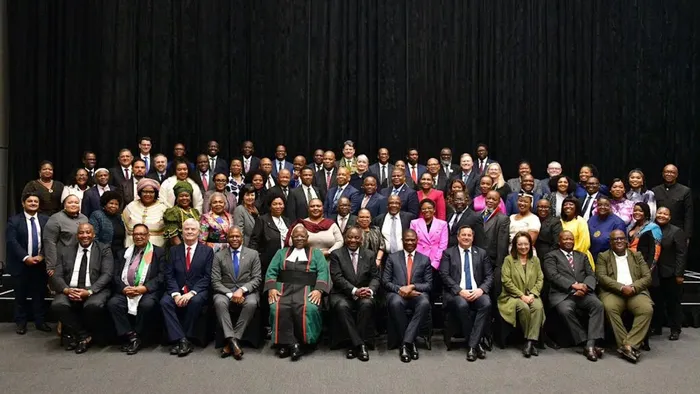Lavish cars, too many ministers: Critics urge Cabinet cuts in 2025 Budget

Political analysts call for a leaner Cabinet as South Africa prepares for Budget 3.0.
Image: Supplied
AS SOUTH Africa approaches the tabling of its 2025/26 Budget, political analysts are intensifying their calls for a more disciplined approach to public spending as Finance Minister Godongwana prepares to deliver Budget 3.0 on Wednesday.
Central to the debate is the size of the government’s Cabinet — a sprawling assembly seen by many as an unnecessary burden on taxpayers and an obstacle to effective governance.
A bloated Cabinet in a costly economy
South Africa’s Cabinet currently comprises 32 ministers and 43 deputy ministers, which is larger than that of many advanced economies.
The United States has 26 cabinet members, the United Kingdom 24, Japan 20, and Germany 17. This expansion has significantly inflated government costs.
ActionSA recently revealed that the current Cabinet configuration is costing taxpayers an additional R239 million annually, amounting to over R1 billion for the current term. This covers salaries, staff, perks, and luxury vehicles, which alone cost about R800,000 per ministry.
Critics argue that such spending is indefensible, especially amid economic stagnation and austerity measures affecting vital sectors like health, education, and public safety.
“The Cabinet’s size and perks drain our economy,” said political analyst Joe Mhlanga.
“We need to cut down on deputy minister positions and streamline our government to ensure funds are allocated where they’re most needed.”
Calls for reduction and reallocation
Mhlanga emphasised that the funds spent on government perks and expanding ministries could be better utilised elsewhere.
“When you look at the results of the work done by these ministers and deputies, there’s little to show. The question is, why keep such a bloated cabinet that isn’t delivering?”
He suggested that the government consider reducing the Cabinet to no more than 20 ministers, abolishing deputy minister roles where possible, and redirecting savings toward critical areas such as public health and education.
“If we want to improve the lives of South Africans, we must reallocate these funds to service delivery and social upliftment,” he added.
Political realities and challenges
Despite mounting pressure, political realities and coalition agreements have kept the Cabinet size large.
“There’s a reluctance among politicians to reduce their influence and perks,” Mhlanga noted.
He argued that President Cyril Ramaphosa, who previously promised to reduce the Cabinet size, has seen the number grow instead.
“When you examine the effectiveness of these ministries, it’s clear that the expansion hasn’t translated into better service delivery,” said Mhlanga.
“The government must face the reality that a leaner cabinet could free up resources for more impactful investments.”
Broader fiscal concerns
The focus on Cabinet size is part of a broader debate on fiscal discipline.
As Minister Godongwana prepares to present Budget 3.0, the Federation of Unions of South Africa (Fedusa) has called for the government to reject austerity measures that disproportionately burden workers and people with low incomes.
Instead, on Monday, Fedusa called for a progressive, inclusive Budget that includes measures like a wealth tax on high-net-worth individuals to help bridge the funding gap.
“South Africa’s economy remains trapped in low growth and high unemployment,” read the Fedusa statement.
“This Budget must prioritise job creation, infrastructure investment, and social protection, rather than cutting essential services or expanding an already cumbersome cabinet.”
A call for strategic cost-cutting
As the country grapples with economic challenges, some believe that streamlining government and redirecting funds could make a tangible difference.
“Reducing the size of the Cabinet isn’t just about saving money; it’s about making the government more effective. Our leaders need to prioritise service delivery over political perks if we are to build a better South Africa.”
Related Topics: